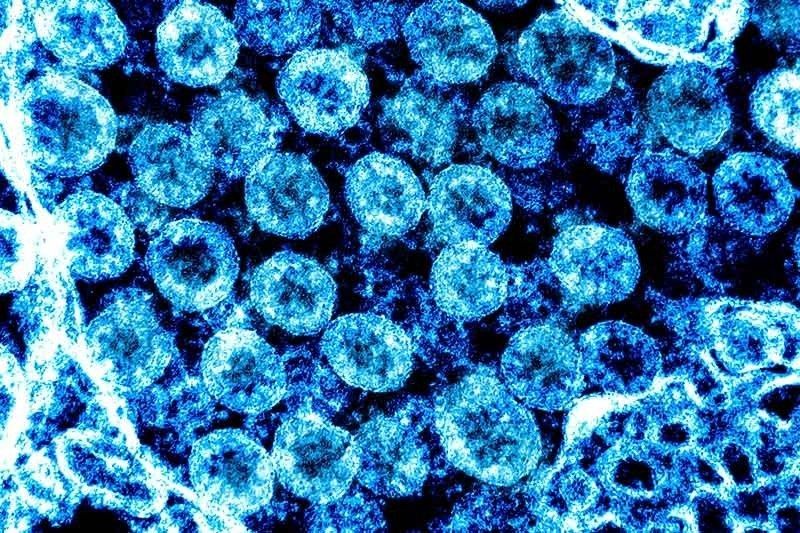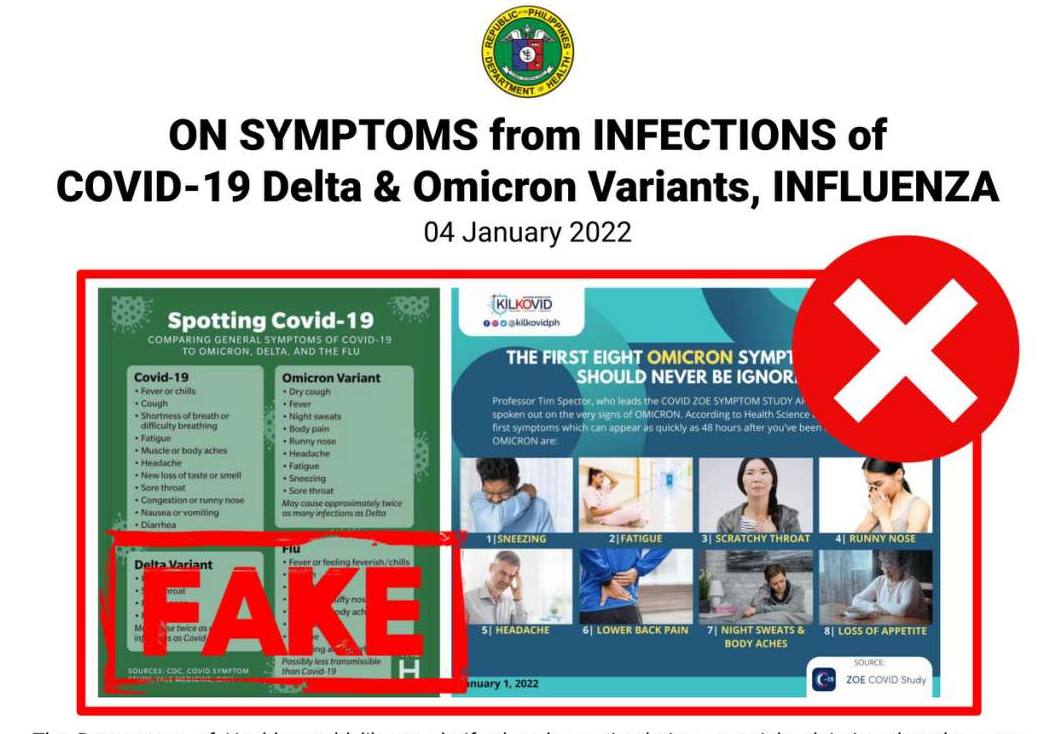Fact check: Omicron and Delta variants 'generally' do not cause different symptoms

MANILA, Philippines — The Department of Health has clarified circulating materials claiming there are differences in symptoms for infections caused by COVID-19's delta and omicron variants and influenza.
CLAIM: The symptoms of the Omicron and Delta variants are different and thus can be used to identify what variant one is infected with. The same symptoms are also comparable to the flu.
RATING: This is misleading.
FACTS: While symptoms can be similar, the Department of Health said it is still best to actually get tested to identify what you're infected with.
What the posts say
Citing a COVID-19 study by health and wellness website ZOE, civic group Kilusang Kontra COVID posted a graphic claiming that "the first symptoms which can appear as quickly as 48 hours after you've been" infected with the Omicron include:
- Sneezing
- Fatigue
- Scratchy throat
- Runny nose
- Headache
- Lower back pain
- Night sweats and body aches
- Loss of appetite
A separate post on spotting COVID-19 and citing the US Center for Disease Control and a study by Yale Medicine compared "general symptoms of COVID-19 to Omicron, Delta, and the flu."
It claimed that what set the Omicron variant apart from COVID-19 and its Delta variant was a dry cough, fever, night sweats, body pain, a runny nose, headache, fatigue, sneezing, and sore through.

Source: Department of Health
What they left out
"This data is incorrect and not released by us," ZOE said in a comment on Kilusang Kontra COVID's graphic as it asked the civic group to take the post down.
"In a time where misinformation is particularly dangerous, we want to ensure we are helping people to access accurate scientific data to understand COVID-19."
Citing the World Health Organization, the DOH said that the usual COVID-19 symptoms are cough, fever, sore throat, fatigue, loss of taste and/or smell, headache, sore throat, body pain, rashes, and conductivities.
"These symptoms are generally similar for COVID-19 infection — whether Delta or Omicron variant, or even with regular flu," the department said.
"It is difficult to tell by symptoms alone what caused your infection. So, once you have symptoms, it is best to test to confirm what you have."
However, health experts have said that the Omicron variant does cause milder symptoms than the more severe Delta variant.
"What we have seen is that those with omicron variant showed milder symptoms. But of course, it's not conclusive because these are just four individuals we are currently observing," Health Undersecretary Maria Rosario Vergeire told ANC's "Headstart" on December 28 when asked about the confirmed Omicron cases in the country.
Comparing Omicron to the Delta variant, the president of the French government's scientific advisory board Jean-Francois Delfraissy said its transmission is much higher but that its severity is probably weaker. "But we don't know how much weaker," he said.
Essential context
Whether about vaccines, self-medicating or self-diagnosing, medical misinformation has been rampant since the start of the coronavirus pandemic around the world.
To date, the Reverse Transcription Polymerase Chain Reaction (RT-PCR) test is considered the “gold standard” in testing for COVID-19.
The DOH was also careful to point out that antigen tests, which diagnose active coronavirus infections and make use of nasal or throat swabs, cannot definitively rule out active COVID-19 infection.
"Antigen tests when used for symptomatic patients are fairly accurate. However, it is not as reliable if it is used for non-symptomatic, so a follow-up RT-PCR may be needed to confirm presence or absence of infection," it said.
"RT-PCR test may be taken already if with symptoms. However, if no symptoms, wait until the 5th day of exposure before testing to increase the reliability of results."
READ: Rapid antibody test, antigen test, RT-PCR test: How are they different?
Why did we fact-check this?
Though the post itself has not gone viral, Kilusang Kontra KOVID's Facebook page has 4,340 likes and 5,790 followers.
The group itself is also led by health reform advocate and former pandemic task force adviser Tony Leachon. It is also partnered with the Quezon City local government.
It has not taken its post down as of this post. Philstar.com could not identify nor locate the other post the DOH debunked.
The DOH's own post on the claims has also reached over 5,700 shares on Facebook.
"Let us be mindful of the information we share. Misinformation can mean life or death.
— Franco Luna with reports from Bella Perez-Rubio and Agence France-Presse
--
This story is part of the Philippine Fact-check Incubator, an Internews initiative to build the fact-checking capacity of news organizations in the Philippines and encourage participation in global fact-checking efforts
Want to know more about our fact-checking initiative? Check our FAQs here.
Have a claim you want fact-checked? Reach out to us at [email protected].
- Latest
- Trending




























